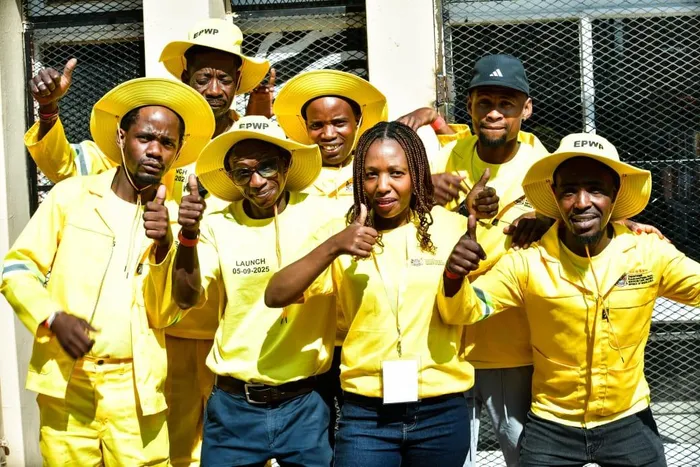OPINION: How the Northern Cape is rewriting South Africa’s employment story
Guest Contributor

EPWP participants give the new initiative the thumbs up during the official launch in Upington.
Image: Supplied / Northern Cape provincial government
By Zandisile Luphahla
* Editor’s note: This opinion piece has been published as received from Mr Luphahla, the Northern Cape Department of Roads and Public Works spokesperson. It has not been edited by the DFA.
When Premier Dr. Zamani Saul launched the Northern Cape's Expanded Public Works’ Second Chance Matric Program in Upington on September 5, targeting more than 600 students across five districts, he wasn't just announcing another government initiative. He was unveiling a blueprint that could revolutionize how South Africa approaches unemployment and skills development.
The numbers tell a compelling story: What began as a modest pilot program initiated by the Northern Cape MEC for Roads and Public Works, Mme Fufe Makatong, on the 6th of September 2024, for 300 women in Frances Baard District has grown into a province-wide initiative that has already produced seven certified graduates in end-user computing, with hundreds more on track to complete everything from basic literacy to full matric certificates.
But this isn't just another feel-good government story. It's a practical solution to one of South Africa's most persistent problems.
For years, the Expanded Public Works Program has been criticized as a Band-Aid solution, offering temporary jobs that lead nowhere. With government requiring a minimum of Grade 9 for permanent positions, EPWP participants often find themselves trapped in endless cycles of short-term contracts, never qualifying for the stable employment they desperately need.
The Northern Cape's approach changes this equation entirely. Instead of treating education and employment as separate challenges, the province has created an integrated system where EPWP participants can study while they work.
The genius lies in recognizing what others saw as a weakness. EPWP's flexible, task-based structure actually creates opportunities for education that traditional 8-to-4 jobs cannot offer. Participants can attend classes, complete assignments, and develop new skills around their work schedules.
This isn't basic adult literacy dressed up with fancy language. The program offers a comprehensive educational journey from foundational reading and writing through Adult Basic Education and Training (ABET) to full National Senior Certificate completion.
Simultaneously, participants gain practical skills that respond to real market demand: computer literacy, welding, baking, early childhood development, painting, and furniture making. This dual approach ensures immediate employability alongside long-term career development.
The initial focus on women was strategically sound, as women face additional barriers to educational access and economic participation. The success of this pilot, evidenced by measurable outcomes like the seven computing graduates, demonstrates the model's potential for broader application.
The Northern Cape model offers several elements that make it immediately replicable across South Africa:
Proven partnerships: The collaboration between Roads and Public Works, Higher Education and Training, Education, and the South African Local Government Association creates a tested blueprint. Each department contributes its strengths: EPWP access, accredited programs, curriculum alignment, and local implementation support.
Flexible entry points: The three-tier educational approach allows participants to enter at their current level and progress at their own pace, accommodating the diverse educational backgrounds typical of EPWP participants nationwide.
Existing infrastructure: The program uses unused government buildings for educational delivery, eliminating major capital expenditure barriers. Every province has underutilized government infrastructure that could be repurposed without significant new investments.
The mathematics is compelling. The cost of providing education to EPWP participants is likely lower than the long-term costs of maintaining them in temporary employment cycles. Educated participants can transition to permanent employment, reducing dependency on public works programs while increasing tax revenues.
Moreover, the skills being developed address documented shortages in the South African economy while meeting international competency frameworks. This alignment between program outputs and both local market needs and global standards increases the likelihood of successful transitions to formal employment.
The Northern Cape's expansion from one district to five provides crucial data on scaling challenges and solutions. Other provinces can establish pilot programs, focusing on these replicable elements:
Start small, scale smart: Begin with one district and 50-100 EPWP participants, focusing on high-demand occupational skills while partnering with existing education and training colleges.
Measure what matters: Track completion rates, employment outcomes, and wage improvements, not just enrollment numbers. The Northern Cape's seven computing graduates represent measurable success that validates the investment.
Build political support: The program's focus on practical skills development and measurable employment outcomes creates political wins across party lines. Education and job creation resonate universally.
This approach aligns with successful international models. India's Mahatma Gandhi National Rural Employment Guarantee Act has provided employment to over 200 million households since 2005, with academic research showing that success comes from combining job creation with skill development and social empowerment.
Argentina's crisis response programs and America's New Deal established the principle that public works should build lasting infrastructure and human capabilities, not merely provide temporary relief.
The Northern Cape is contributing to this global body of knowledge while addressing uniquely South African challenges.
South Africa faces an unemployment crisis that demands innovative solutions. The Northern Cape's EPWP education model offers a tested approach that addresses root causes rather than symptoms.
The transformation of EPWP from a criticized stopgap measure into a genuine pathway to economic participation could represent one of South Africa's most significant policy innovations.
The question is not whether this model can work; the Northern Cape has already proven that. The question is whether other provinces have the vision and commitment to replicate and enhance this breakthrough approach to human development.
As the program expands to target more than 600 students across diverse courses, from basic literacy to welding, it demonstrates appeal across skill levels and career aspirations. This breadth makes it both politically sustainable and economically relevant.
The Northern Cape has shown the way. Now it's time for the rest of South Africa to follow.
…
* The opinions expressed in this article are those of the author and do not necessarily reflect the views or policies of the DFA or its staff. While we strive to provide a platform for diverse perspectives, the content remains the sole responsibility of the contributor. Readers are encouraged to form their own opinions based on a range of information sources.
** Do you have something on your mind? We’d love to hear from you! Share your thoughts, opinions, or experiences by submitting a Letter to the Editor. Your voice matters and could inspire or inform others in our community. Submit your letter via e-mail to info.dfa@acm.co.za and you could see your words featured in the DFA.

We’d love to hear from you!
Image: Morgan Morgan / DFA
Related Topics: